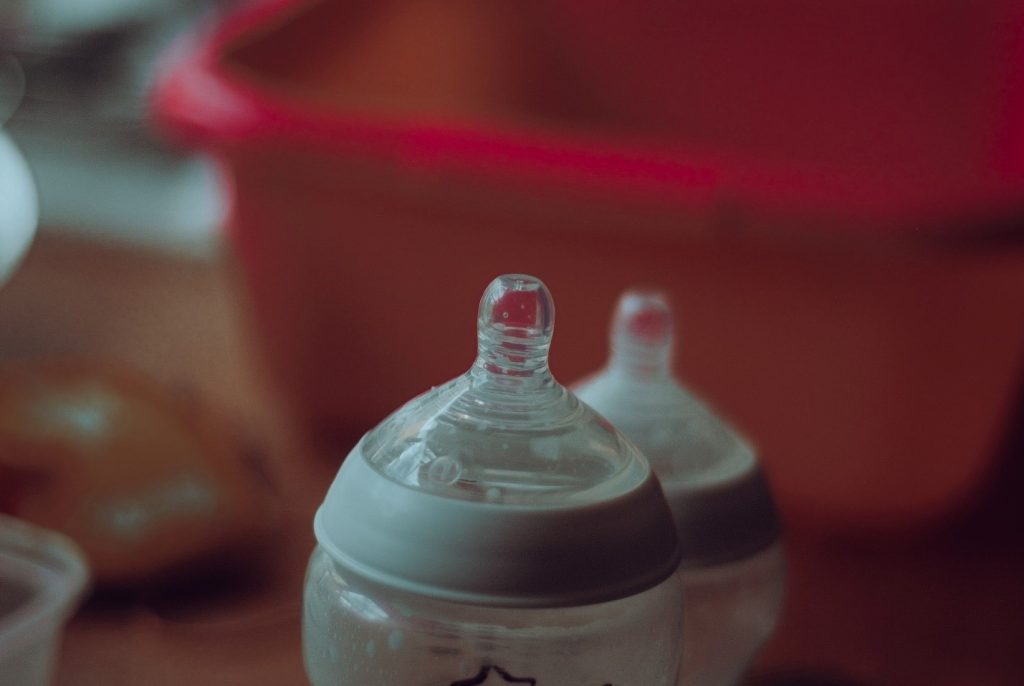Parents always want to ensure that their babies are healthy and safe. Unfortunately, some parents can find difficulty in feeding their babies when their formula-fed babies suddenly begin to refuse the bottle. This issue is quite prevalent as some studies cite that about 20-30% of infants and toddlers have feeding-related problems, running the risk of nutritional imbalance. Thus, it is imperative to understand the various reasons why this happens so that parents can address the issue right away.
It is possible that your baby is refusing the bottle because they are not interested at all – they could either be not hungry or tired. Your baby might also be picky about certain things such as the temperature, the taste, the feeding position, the milk flow, or even the bottle itself. Too many distractions might also be a cause for the refusal. Lastly, your baby might be going through something such as a sickness or teething.
This article will discuss the various reasons why formula-fed babies would suddenly refuse the bottle. Several solutions will also be included to overcome the problem.
Possible Reasons Why Formula-Fed Baby is Suddenly Refusing Bottle
-
Lack of Hunger
Probably the most common reason why your formula-fed baby is suddenly refusing the bottle is a lack of hunger. It is understandable for parents to worry when their babies are refusing to feed, but it could simply be that your baby is no longer hungry.
Did your baby refuse the bottle at the end of a feeding session? When was the last time you fed your baby? These are some questions to ask yourself to rationalize whether your baby is simply not hungry.
Unfortunately, it can be quite tricky to communicate with babies since they only have a limited number of ways to tell their parents something is wrong. If you thought your baby was hungry because they were crying and yet they refuse the bottle, then it is possible that they were signaling for something else. Aside from hunger, common reasons for a baby crying are sleepiness and a wet diaper. Go through your usual checklist until you find the actual reason for your baby crying.
-
Temperature Preference
Just as how everyone has their own food preferences, babies can have certain preferences when it comes to their milk as well. Have you ever thought of the temperature of the milk when you give it to your baby? It is possible that your baby is refusing the bottle as the temperature of the milk is not to their liking.
If you suspect that your baby refusing the bottle is due to a temperature preference, you can try offering the bottle at various temperatures to determine if your baby does indeed have a preference. While some babies prefer their milk a little cooler, some prefer their milk warm. Offering room temperature milk is also worth a shot.
-
Uncomfortable Position
Just like how there are different kinds of positions for breastfeeding, there are also different positions for bottle feeding. If your baby refuses the bottle, it is possible that they are in an uncomfortable position. When a baby is uncomfortable, they would not be able to concentrate on feeding, making it a problem.
There are different positions available for bottle feeding your baby. The first one to try is bottle feeding the baby while cradling them. The baby’s head is supported by the crook of the parent’s elbow while the rest of the body is supported by the arm. The parent’s other hand can then hold the bottle for the baby to drink from. It is important to remember to tilt the baby’s body up so that they are at an angle. Having a baby feed at a horizontal position can be a choking hazard.
The baby can also drink milk from an upright sitting position. There are various ways to feed the baby in this position. A popular way to do this is when the mother is lying back with her knees propped up. The baby can then sit on the top of your lap while leaning back on your knees. This is a wonderful position for those who want to maintain ample eye contact with the baby during feeding.
-
Tired
Aside from not being hungry, another common reason your formula-fed baby is refusing the bottle is that they are simply tired. A tired baby will refuse the bottle as they would rather get some rest.
One way to determine if this is the issue is by checking other signs of tiredness. These signs can include yawning, rubbing the face, and fluttering eyelids. If you lay your baby down and they fall asleep soon after, then that can be a confirmation that they were already tired.
-
Too Many Distractions
When you begin to notice your formula-fed baby suddenly refusing the bottle, it is possible that they are becoming more and more distracted.
Distractions are not necessarily a bad thing. In fact, babies being distracted can be an indicator of cognitive development. While your baby is growing and changing before your very eyes, their minds are also becoming more and more aware.
Throughout the baby’s first year, there are certain milestones that signify their mental development. These moments are often considered their Wonder Weeks as described by physical anthropologist Hetty van de Rijt and developmental psychologist Frans Plooij. Throughout these wonder weeks, babies become more and more distracted as they become more aware of the world around them. While a random dog barking outside may not have mattered so much when they were born, now they have become incredibly curious about everything around them.
If you suspect that it has become difficult to bottle feed your baby due to their newfound curiosity about the world, it can help you get them to drink their milk by bottle feeding them somewhere with fewer distractions. This can be in a boring room without anything distinct that can catch their attention. You can even close the curtains and turn off the lights to darken the room.
A white noise machine might also be worth getting to reduce unwanted noise. While it may sound counterintuitive to get a machine that makes sounds, a white noise machine makes repetitive soothing sounds that can fill a room with white noise. White noise can then help drone out other sudden sounds that may occur outside of the room. For example, a car alarm wouldn’t sound as blaring when a white noise machine is playing ocean sounds inside the room.
Another way to deal with distractions is by offering smaller amounts of milk more frequently. By offering smaller amounts of milk, you can be more confident that they will be able to finish what you give them. This will take them less time to feed and not be distracted along the way.
-
Sickness
Although it may be unthinkable, it is unfortunately possible that your formula-fed baby is refusing the bottle because they are sick. People often eat less when they are sick due to a lack of appetite, and this extends to babies as well.
There are various medical conditions that can commonly occur to your baby. These include infections, congestion, acid reflux, and more. These are conditions that can be detected at home. Although these conditions are not serious enough to warrant a visit to the pediatrician, you should never feel hesitant to visit the hospital if you feel something is wrong.
On the other hand, there are other conditions that should make you schedule a visit to the pediatrician as soon as possible. You should give your doctor a call if your baby is exhibiting fever, diarrhea, vomiting, or difficult breathing.
-
Teething
There are countless anecdotes of people eating less when they have just gotten their braces due to the pain. This is the most parallel experience when babies are teething. As each tooth pushes through the baby’s gums, the baby can be in significant pain and discomfort, thereby leading to a reduced intake of milk.
Teething can be quite a different experience for different babies. While most babies start teething at 6 months, some can start before 4 months, and some start after 12. Some babies are even born with teeth already.
If your baby is refusing the bottle, it is possible that they are teething. To determine if your baby is indeed teething, you can check the other signs associated with a teething baby.
- The baby’s gums are sore and red.
- The baby’s cheek is flushed.
- The baby rubs the side of their face often.
- The baby dribbles saliva more than usual.
- The baby chews on objects frequently.
- The baby does not sleep well.
If you have confirmed that your baby is indeed teething, the only approach is to comfort them during this time. Babies that chew on objects should be given safe things to chew on such as fruits or vegetables. They chew on things as the pressure can help alleviate the pain. You can also be more playful with the baby to distract them from the discomfort.
-
Milk Flow
When babies breastfeed, milk flow is controlled by the mother’s let-down reflex – the phenomenon when milk flow is activated when nerves in the nipple are triggered. Although bottle feeding does not follow the same principle, milk flow affects the baby in the same way.
Babies can be quite picky when it comes to milk flow. When milk flow is too slow, babies can be irritated and fussy. On the other hand, an overactive milk flow can be too much for a baby and even cause them to swallow air. Thus, it is important for milk flow to be just right.
If your baby is refusing the bottle, it is possible that they are not comfortable with the bottle’s milk flow. It is important to understand that the milk flow of a bottle is controlled by the nipple. Thus, changing the milk flow of a bottle is as easy as changing the bottle’s nipple.
-
Taste
It is interesting to note that humans have the most taste buds when they are infants. Once babies are born, they have an estimate of 30,000 taste buds. The number then decreases throughout a person’s life. This is the reason why baby food can be quite bland to adults, but delicious to babies. Thus, your baby might also be refusing the bottle if they do not like the taste.
Did you change brands of formula recently? If so, it is possible that your baby is refusing the bottle as their way of telling you that they preferred the other one. A simple way to determine the root of this issue is to go back to the original brand of formula you were using and see how your baby reacts to it.
Another common issue is when bottles are not cleaned properly. Not cleaning the bottles can leave some residues that can ultimately affect the overall taste of the milk.
-
Bottle
Babies can be very picky people. Not only can they be picky about the taste of the milk, but they can even be quite specific when it comes to the bottle used. It is important to remember that babies are still exploring the world around them, thus they can have very strong opinions regarding the feel and texture of the bottle used.
Do you use different types of bottles? Does your baby refuse all bottles or just some? If you suspect that your baby is refusing the bottle due to how the bottle feels, then it might help you to experiment with different types of bottles. Try out bottles of different shapes and sizes to find out if your baby has a preferred bottle-type.
Tips to Improve Bottle Feeding
-
Have a Routine
A great way to improve the bottle-feeding experience is to develop a daily routine. It may seem difficult to get into a routine when taking care of a baby but the soonest you can develop a routine, the better.
When you get your baby into a routine, daily tasks can be done much smoother. This is because the baby becomes accustomed to certain activities at certain times. While they may not be conscious about it, their body is. Specifically, their body can get accustomed to certain activities and produce the necessary hormones to trigger the baby’s responses.
For example, it is easier to put a baby to sleep when their bedtime is at the same time every night. If you keep doing this, their body will eventually produce melatonin, the hormone that controls sleep patterns, around that time.
Thus, if you feed the baby at the same time every day, you might be able to get their body on a schedule. You can possibly get their hormones to tell them that they are hungry at that time because that is the time feeding usually occurs. Hunger can then help get them to drink their milk without any complications. This is the same principle when people get hungry around the times they usually eat breakfast, lunch, or dinner.
-
Remain Calm
While it can be frustrating when your baby refuses the bottle, remaining calm can be more helpful than being agitated. Babies can often be quite empathetic and mirror what they see in you. Thus, it would be more helpful to remain calm so that your baby might emulate you and remain calm as well.









